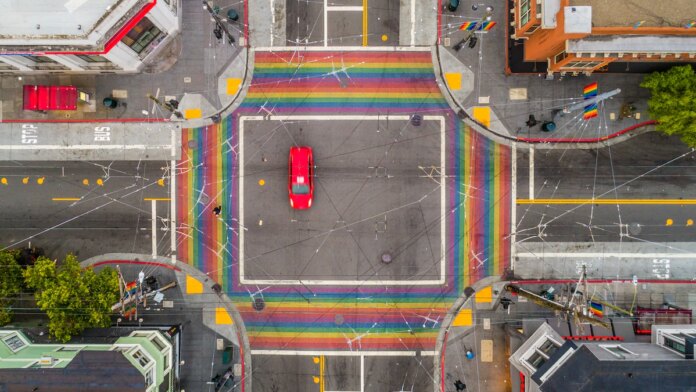It’s well after midnight, and Madrid’s Plaza de Chueca is living up to its title as the fizzing, thumping heart of the Spanish capital’s gay district. The warm air quivers with the sound of voices, not only in Spanish, but also in languages from around the world.
Progressive laws and largely liberal attitudes within Spain have made it a haven for LGBTQ+ travelers, who have long flocked to the country’s cities, coasts and islands.
Perhaps there’s a native link between the LGBTQ+ community and travel, as John Tanzella, president of the International LGBTQ+ Travel Association (IGLTA), says.
“The very nature of being LGBTQ+ means there’s an open-mindedness and desire to see the world,” he says. “This is a loyal community that loves to travel multiple times a year and spends a lot every time. Suddenly it’s clear why companies want to reach us.”
Barcelona, Spain, has a lively gay scene, especially in the neighborhoods of Eixample and Gràcia. A popular place to see the sun set is at the Bunkers del Carmel, seen here, in the El Carmel district.
Photograph by Westend61, Veam / Getty Images
Please be respectful of copyright. Unauthorized use is prohibited.
The rewards can be lucrative: research by corporate advisory and asset management company LGBT Capital estimates that the sector has a global spending power of $3.9 trillion. There’s even a name for it—“pink money.” But the experiences offered in return don’t always measure up.
“All too often, travelers pay hundreds a night, only to have a poor experience,” explains Simon Mayle, the event director of Proud Experiences, a convention for LGBTQ+ travel businesses. “The bar is often simply too low.” Mayle cites his-and-her slippers in bathrooms and awkward conversations about beds at check-in as examples. Some couples, he adds, are even turned away entirely.
Others may scratch their heads as to why hospitality sees the need to tailor service towards heterosexual pairings at all—after all, most travelers are looking for the same things: exploration, relaxation, scenic beauty and historic sites, according to recent studies.
(These digital tools help Black and LGBTQ+ travelers travel safely.)
But for all the common ground, the travel experience itself can be very different for the LGBTQ+ community: when and where to show affection, laws around same-sex activity, and gender-related issues concerning passports, to name a few.
In 2010, Preferred Hotels & Resorts created the Preferred Pride program—a collection of hotels that puts the experience of LGBTQ+ travelers front and center. For Rick Stiffler, senior vice president of sales-leisure, it was partly driven by a desire to see more initiative in the hotel world. He believed too few brands were making real efforts when it came to inclusivity.
“We wanted our hotels to really engage with the community, both locally and internationally,” he says. “If they truly want this business, then they need to show it… If a hotel is inclusive of LGBTQ+ people, then it’s going to be inclusive of everyone, and that matters.”
So how are destinations around the world representing the full spectrum of the community? And what remains to be done on behalf of businesses looking to advertise acceptance and equality? Here’s the state of play now.
Seeing the spectrum
In recent decades, improved understanding and more inclusive services have helped to give the LGBTQ+ community more confidence when traveling, but not everything has quite caught up with the times.
A quick Google image search using the words “gay travel” reveals no shortage of well-toned, beach-loving, predominantly male couples. For a community defined by its diversity, the online reality can still feel one-dimensional.
Crowds flock to Copacabana Beach in Rio de Janeiro, Brazil, a popular destination for LBGTQ+ travelers.
Photograph by ROBERT HARDING PICTURE LIBRARY, Nat Geo Image Collection
Please be respectful of copyright. Unauthorized use is prohibited.
But some countries have already taken note: in 2013, Thailand launched its “Go Thai. Be Free” campaign, with a comprehensive list of experiences, hotels, and destination guides geared towards LGBTQ+ travelers, featuring people of all colors and orientations. Malta, meanwhile, has positioned itself as one of Europe’s most welcoming destinations through more inclusive marketing, in step with improved equality laws within the country.
Stiffler believes there’s been a genuine shift in travel to reflect an audience that’s more eclectic than ever, including same-sex-parented families and trans and non-binary travelers. “Adverts should look like real people in the community, not just two models posing on a beach,” he explains.
(Why LGBTQ+ travelers face difficult choices of coming out abroad.)
Jill Cruse is the vice president of guest experience at Olivia Travel, an operator based in San Francisco with mostly lesbian clientele. She’s enthusiastic about the kinship that comes from the company’s group trips, which, she says, have even more value after two years of social isolation. She believes LGBTQ+ travelers are seeing the benefit of being among like-minded people again. “It means you’re free to be yourself, and, really, there’s nothing like feeling accepted.”
The types of trips this community is seeking are also changing. According to Burn, well-established LGBTQ+ destinations such as Thailand, Gran Canaria, and Ibiza are still popular, but he’s also seeing travelers demonstrating their confidence with more adventurous trips, too. “We’re seeing more and more solo travelers in the market, too; single gay men looking to join an epic group hikes in Machu Picchu, for instance,” he says.
However attractive these destinations may be, many are still unwelcoming, even dangerous to LGBTQ+ travelers. Equality tracker Equaldex lists over 70 countries as having homophobic laws, several of them even enforcing capital punishment for same-sex activity. But being open-minded can be beneficial, says Burn. “It’s worth remembering that these countries have gay citizens, too,” he says. “Tourism can show people that, really, we’re no different after all.”
The benefits of welcoming diverse, broad-minded travelers have paid off for some destinations. Tel Aviv and Rio de Janeiro, says Mayle, have woken up not just to the financial rewards of an inclusive approach, but also the more human benefits, too. “LGBTQ+ people are, by nature, welcoming and open people,” he says. “Plus, many of us have a big network of like-minded people back home.”
Walking the walk
Any legislative change begins at the top, of course, but certain governments pose a challenge for the industry. In these cases, companies looking to directly advertise to gay, lesbian, or trans travelers can rarely do so overtly.
The Seychelles Islands, seen here, is among the few African countries to offer protections for LGBTQ+ people.
Photograph by THOMAS P. PESCHAK, Nat Geo Image Collection
Please be respectful of copyright. Unauthorized use is prohibited.
Burn argues that such destinations—which often happily take bookings from LGBTQ+ travelers—need to put their money where their mouth is. “A lot of them rely on the money of these travelers, but are they making inroads with getting laws changed?” he asks. “It’s not fair to have one rule for citizens and another for visitors.”
Despite this, there’s been tentative progress in countries that, until recently, lagged well behind in terms of equality.
In 2019, the Botswana High Court ruled in favor of decriminalizing homosexuality, and similar moves have been made in the Seychelles, Mozambique, and Trinidad and Tobago in recent years.
Change takes time, says Cruse, claiming that some destinations, such as the Bahamas, were hesitant about welcoming a lesbian cruise in the early 1990s. “Once we [the company] came into the market, people got to know us and realized we were no different, things started to change.”
Mayle believes it isn’t too late for companies looking to make a positive change, but the key is doing it with purpose and authenticity. Tanzella agrees, saying that lip service is no longer enough to convince travelers that the industry cares. “If you claim to appreciate diversity, but your board of directors looks the same, you’re not walking the walk,” he says. “You need to really mean what you’re doing.”
Streff says travelers today are savvy, and that a rainbow sticker in the window is no bad thing but needs to go much further. “Diversity is something that needs to be reflected behind the scenes, too, so consumers know it’s genuine,” he says.
Authenticity has worked for Madrid, at least. Of course, there are rainbow flags and stickers aplenty, but it’s the progress that counts most: this is the capital of a country where same-sex marriage was legalized nationwide in 2005—the third country in the world to do so after the Netherlands and Belgium. Perhaps it’s proof that if you show the world you’re open-minded, people will come.
Other nations might want to take note: after all, where LGBTQ+ travelers go, others follow. “It happened with Ibiza, and now we’re seeing it with Mykonos—suddenly everyone’s going,” says Burn. “It’s almost a question of ‘where will the gays go next?’”
Five cities to watch
Brighton and Hove, U.K.
It’s almost been three, pandemic-beleaguered years since the city last hosted a Pride event, but this summer sees the return of the country’s biggest (and arguably best) Pride celebration. A weekend chock-full of concerts, parades, street parties, cabaret and even a dog show will make up the delayed 30th anniversary celebrations. August 5-7.
Belgrade, Serbia
While attitudes in Serbia remain mixed, laws have improved considerably over the past decade. Openly gay prime minister Ana Brnabić took office in 2016, and this year the city will host Europride, the continent’s biggest Pride festival. Previous events in the city have faced intense hostility, so this is a watershed moment for the country’s LGBTQ+ community. September 12-18.
Toronto, Canada
In December, Canada followed the likes of Brazil, Germany and Malta in banning the controversial practice of conversion therapy—another sign of the country’s progressive stance on equality. Multicultural Toronto is the nexus of the country’s LGBTQ+ scene—set to come alive for a month of eclectic Pride celebrations in June.
Valletta, Malta
Malta topped the ILGA-Europe Rainbow Index for a sixth consecutive year in 2021. The metric analyzed the equality policies of 49 European countries and found that open-minded Malta is streets ahead of many of its neighbors, with recent amendments including an updated policy for LGBTQ+ refugee claims.
Sydney, Australia
The cosmopolitan Australian city takes up the mantle as host of World Pride in February 2023. This will be the first time the event has been held in the Southern Hemisphere, so expect a celebratory 17- day program of Pride marches, beach parties, conferences and a First Nations gala concert. February 17 to March 5, 2023.
Connor McGovern is a commissioning editor at National Geographic UK. You can find him on Twitter.
This article is adapted from a story published in the April 2022 issue of National Geographic Traveller (U.K.).










